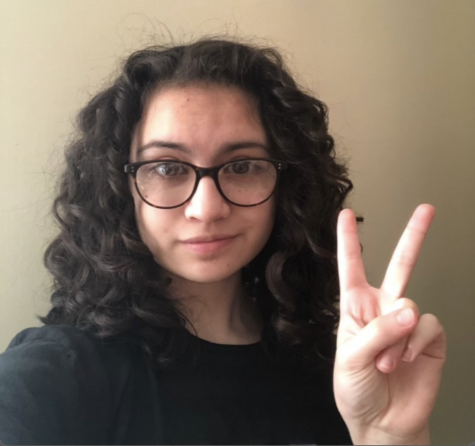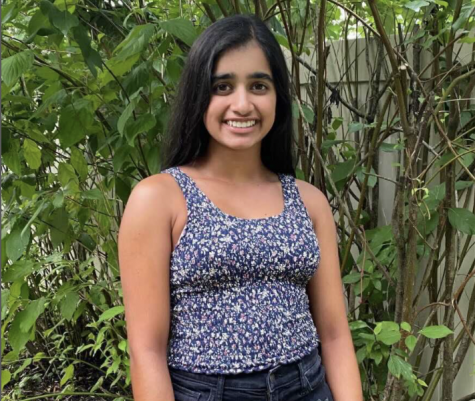What does it mean to be a first-generation student?
February 22, 2021
To be a first-generation immigrant student means you have at least one parent who is from a foregin country. Being a second-generation immigrant means having grandparents that were immigrants while your parents were born in the United States. Growing up in America and having relative(s) who grew up in a totally different environment changes your perspective on many different aspects such as your culture, religion, and school. These aspects affect students socially, culturally, and academically as their perception of American culture is different from those of students with parents both from America. But what does that truly mean as an East student? Here are a few accounts from Cherry Hill East Students who experience this every day.
STUDENTS:
Alena Zhang (’23):
I’ve grown up with the aroma of dumplings and apple pie wafting from the same table. I’ve listened to fragments of Chinese mixed with snippets of English. Perhaps that is what being a first-generation student means – the blending of cultures and bringing out the beautiful parts in each. While I may not be in China and living in Shandong like my parents had, the stories that I hear, the harmony of languages mingling together, and the annual traditions that have originated from so rich a culture have allowed me to experience the vividness of my Chinese and American background in full technicolor.
Yena Son (’22):
For me, being a first-generation immigrant student has been truly a blessing but also extremely confusing at times. Through my experiences, I have been able to learn about the beauty of holding two different cultures and also learn how to appreciate the differences between each one. I will say though, at times I have found myself questioning which culture I truly belong to as an Asian-American but I have realized that I don’t need to categorize myself into one which is the great thing about being a first-generation student. I feel very grateful towards my parents for giving me the opportunity to encounter all the beautiful teaching moments that come with being a child of immigrant parents.
Avi Shohat (’23):
Being a first-generation student signifies a unique message for every individual who proclaims that name. Even so, those who do not proclaim it experience their own circumstances and embody various situations that will only become memories. Those memories do not always prove to be favorable, however, each one reminds the individual of who they chose to be within that moment, who they are in the present, and who they will choose to be in the future. Culturally, religiously, socially, and academically, among more, I learn more about myself every day through the perspectives of my parents and the lenses of my own. My encounters in life have, do, and will vary compared to those of my parents, and although this is true, I cannot imagine who I would be without the foreign characteristics my parents had introduced to me at a young age – music, tradition, food, language, etc. The significance of their upbringings and their incomparable encounters are included in the essentials I hold on to when I feel I forget who I am. I cannot change them as they will forever remain constant. Furthermore, the attributes I possess are those that help me reflect on the qualities that I may improve, or that may be altered. That is what is so beautiful about learning to adjust to a society, through challenges I will not neglect, and in growing into the person I aspire to be. My genetics are beyond my control, and that fact has helped me comprehend the cruciality of acceptance and in learning to be the person that is within the palms of my hands.

Yahel Amsili (’22):
It’s great! Being a part of two cultures in the United States is not uncommon; it is definitely more of an advantage than a disadvantage.
Abigail Nahum (’23):

As a first-generation student I feel like any ordinary student. But it’s cool since me and my dad have very different experiences with school. At schools like Cherry Hill East that have many first-generation students, which makes it feel normal since our school is so diverse.
Mia Ripa (’22):

To me, being second-generation means that I’m able to be thankful for the sacrifices my grandparents and my mom made. My grandparents came to America to have a family and find more opportunities. I’m thankful to my mom because even though she was little when she immigrated, she as an adult feels like she’s more Americanized since she didn’t have a traditional Filipino childhood and in turn wants to make up for years of lost time by connecting more to her roots. I relate to how my mom feels because while she’s full, I’m only half Filipino and I’m white-passing. And I feel weird asking questions to my Filipino friends because I feel like I don’t fit in since my mom and I are both very Americanized, and we didn’t have a similar upbringing in terms of culture as my friends did. In short, while I don’t really think about being second-generation since I feel extremely detached from that side of my heritage, it helps me recognize the sacrifice my grandparents made by leaving their home, and mom to a home she barely got to experience.
Ajuni Oberoi (’24):

Growing up with parents that are immigrants did not seem like it was a big deal when I was younger. Looking back on it now, I can see all the experiences that my parents went through in order to get a better life in America. My mom moved to America from India when she was a freshman in high school, and she quickly had to adapt to a new school and essentially a new life. Knowing now that she had to work extremely hard to get a good education and to have the same experiences as other high school kids makes me want to be able to work harder and continue to grow. My dad came to America from India for his residency after he went to medical school. He came here to do his residency to also further enhance his education in order to become an anesthesiologist. My dad had to work extremely hard to get this residency and then a job here after he immigrated from India. Knowing that I am the daughter of two immigrants, who were able to work hard and build everything they have today from scratch, is incredible and it motivates me to work hard and find the right spot for me in our society.
Rebecca Germaine (’21):


As a first-generation student, I am constantly grateful. Everyday when I come to class and I do my schoolwork, I’m grateful to have the opportunity to receive a good education and have the ability to pursue whatever career interests me. Oftentimes I hear students complaining about school, as I’m sure we all have, but being a first-generation student means I get to share my family’s story with other people and remind them that others around the globe envy the quality of life they currently lead. I work hard in school not only for my future, but to continue on the legacy of my hard working immigrant parents and grandparents.
Nysa Chawla (‘24):
Being a second-generation student, I feel responsible to carry traditions of my family to East. For me, I try to live up to my parents expectations while teaching them new things as well. It means a lot for my family for me to be fully brought up in American and fulfill their American Dream.
